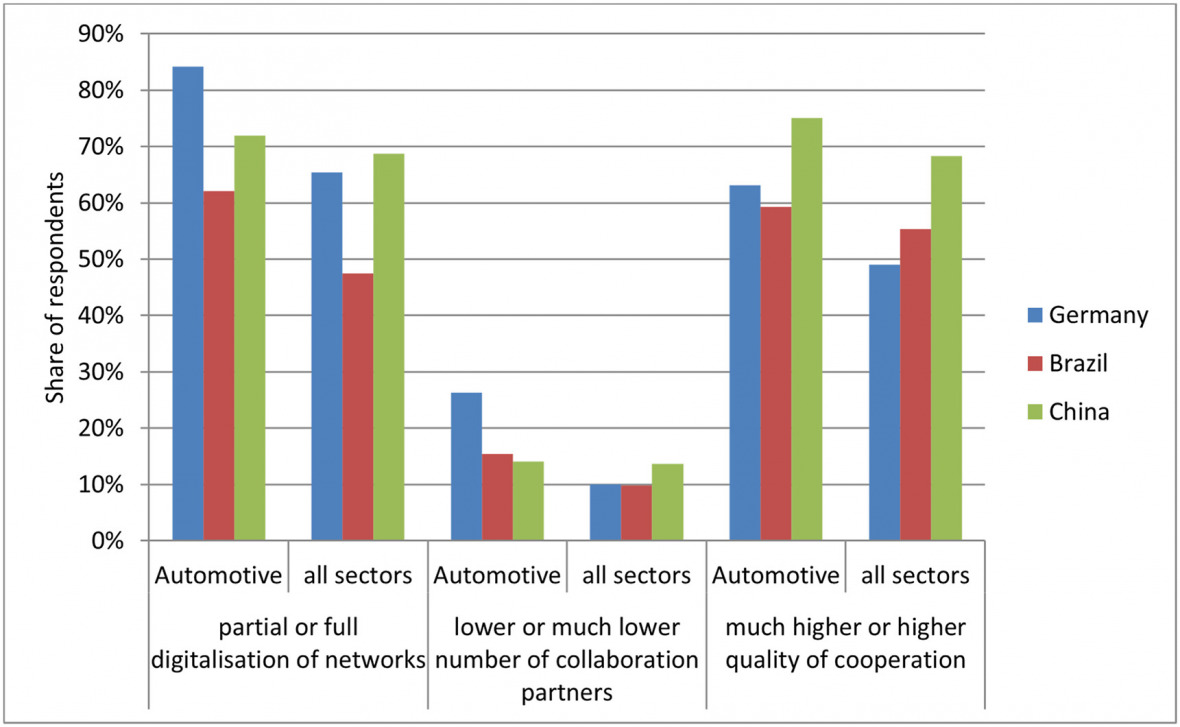Industry 4.0: Uneven Uptake Could Jeopardise Sustainable Development
28.11.2022
The ninth United Nations Sustainable Development Goal aims to promote inclusive and sustainable industrialisation. Digitalisation is expected to influence market access and the positioning of companies within sustainable value chains. Individual countries or sectors that are slower to adopt digital technologies risk being left behind in this transformation. A new study offers insights into the uneven uptake of digital technologies and its implications.

“Environmental management along the supply chain can be enhanced through the use of digital technologies to facilitate a continuous flow of information and improve transparency. This can reveal threats to sustainability such as offshoring to countries with lower social and environmental standards, and offers insights into opportunities to improve the sustainability of global value chains”, explains lead author Silke Niehoff (IASS). Investment in digital tools and knowledge is currently lacking in some developing countries.
The study compares the development of digitalisation in the emerging markets of China and Brazil and the industrialised economy of Germany. Employees from companies of different sizes and across several sectors were surveyed. The results offer insights into how digital transformations unfold in countries with very different starting points.
Smaller companies lagging behind
The researchers were able to show that differences in the digitalisation of value chains are not as pronounced at the country level as experts had predicted. However, clear differences emerged within all countries with respect to the level of digitalisation achieved across sectors and within companies of different sizes. Across all countries, fewer than 10 percent of the companies surveyed reported plans to fully digitalise collaboration processes. A partial digitalisation is more common: 46 percent of Brazilian, 61 percent of Chinese and 63 percent of German companies already operate in this way.
In all three countries, large companies make greater use of the opportunities offered by digitalisation than small and medium-sized enterprises (SMEs). "It is important to remember that SMEs form the backbone of countries’ economies and they should not be left behind. Global governance is needed to identify uneven development at the country level and strengthen national support policies for SMEs where necessary”, says co-author Grischa Beier (IASS).

Progress on the digitalisation of collaboration processes differs among larger and smaller companies. (c) IASS
The sustainability of production processes could be improved by fully integrating production data into companies’ environmental management systems. This would potentially simplify compliance with environmental standards and certification processes for companies and regulators, which often require analyses spanning the entire value chain. However, only 9 percent of German, 3 percent of Brazilian and 6 percent of Chinese companies have fully integrated production data into their environmental management systems.
The automotive industry as a digitalisation frontrunner
In Germany, 84 percent of respondents from the automotive sector reported at least the partial digitalisation of collaboration processes, compared with 72 percent of Chinese and 62 percent of Brazilian companies. More than in the other sectors covered in this survey, respondents from the automotive sector reported that digitalisation had led to a decrease in the number of partners, while the quality of cooperation had improved as a result. According to the authors, the automotive sector is an interesting field for future research and other companies could learn much from an evaluation of the experiences gained in this sector.

Comparison of the characteristics of digital collaboration processes in the automotive sector with other sectors. (c) IASS
Publication:
- Niehoff, S., Matthess, M., Zwar, C., Kunkel, S., Guan, T., Chen, L., Xue, B., de Oliveira Pereira Grudzien, D. I., Pinheiro de Lima, E., & Beier, G. (2022). Sustainability related impacts of digitalisation on cooperation in global value chains: An exploratory study comparing companies in China, Brazil and Germany. Journal of cleaner production, 379: 134606. https://doi.org/10.1016/j.jclepro.2022.134606
Contact

